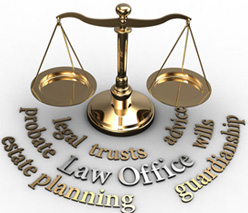
Practice Areas

Estate Planning
Estate planning is for everyone. It involves what happens to your property when you die and arranging for its distribution in such a way as to accomplish your objectives. Your estate consists of everything you own. This includes tangible property, such as your home, car, and any other objects you might have. Intangible property includes insurance, bank accounts, stocks, and Social Security benefits. In order to ensure that your estate and assets go to whom you wish, you must create an estate plan that includes such directions.

An estate plan aims to preserve the maximum amount of wealth possible for the intended beneficiaries and often retains considerable flexibility for the individual before death. Estate planning allows you to design strategies that preserve and protect your legacy. We assist you with a wide range of estate planning needs, from helping transfer assets to their beneficiaries to gifting and succession planning strategies. We will help to ensure that all the necessary estate planning documents, (wills, trusts, powers of attorney, beneficiary designations, etc.) are present and in order. Creating an estate plan is not only for your own peace of mind, but your family's, as well.
You can also determine what medical decisions should be made on your behalf if you become incapacitated or severely ill by creating a healthcare advance directive. This way, your family will know what your wishes are in terms of medical decisions, such as prolonging life support, or receiving certain treatments for possible illnesses.
If you do not have an estate planning document to name your beneficiaries, the laws of the state will decide who gets your assets, who administers your estate, and who becomes the guardian of your children. If you are married, part of your assets may go to your children or other relatives instead of all to your spouse as you would have expected.
The Federal estate tax is an excise tax levied on the transfer of a person's assets when they pass away. At a person's passing, the assets that he/she owned at the time of death become subject to a federal tax that is referred to as an estate tax. Although Florida does not have an estate tax, depending on where your assets are located, some states charge a second tier of taxation on assets passing at death, and that tax is referred to as an inheritance or succession tax.
On December 22, 2017, the most sweeping tax legislation since the Tax Reform Act of 1986 was signed into law. The Tax Cuts and Jobs Act of 2017 (TCJA) doubled the amount of property that a person can gift or pass upon death without incurring estate, gift, or generation-skipping transfer tax.
Under the TCJA, the act doubled the amount that would be free of these transfer taxes (the "Applicable Exclusion") to $11.2 million (if single) and $22.4 million (if married) for gifts made, and estates of decedents dying after December 31, 2017, and before January 1, 2026. The exemption is indexed for inflation and increase annually based on the cost of living. For 2020, the exemption is $11.58 million per individual, up from $11.4 million in 2019. This increase in the Applicable Exclusion amount will serve to make the estate tax a non-issue for more individuals.
In addition to the above-mentioned exemption, married couples enjoy an unlimited deduction for transfers to one another. While it is beneficial for many couples who choose to leave their estate to each other, without proper planning, it can result in a forfeiture of some of the individual estate tax exemption after the passing of the second spouse. To address the issue of a possible estate tax upon the second spouse's passing, the current estate tax law allows for "portability" of individual exemptions between spouses. However, with that said, portability is not automatic and requires proper planning and implementation to ensure proper filing of the estate tax return is made with the IRS with 9 months of the passing of the first spouse, even if there are no taxes due at the time.
At Feldman Legal PA we can help you understand the goals for your estate and assist you with ensuring that your estate will be distributed according to your wishes. If you want to learn about how we can help, please feel free to contact our office.

Disclaimer
The hiring of a lawyer is an important decision that should not be based solely upon advertisements. Before you decide, ask us to send you free written information about our qualifications and experience. This website is designed for general information only. The receipt of information presented at this site should not be construed to be formal legal advice nor the formation of a lawyer/client relationship. Online readers should not act upon any information on this website without first seeking professional counsel. Some links within this website may lead to other sites. We do not necessarily endorse, sponsor or otherwise approve of any third-party content that may be accessed through this website. Contacting us does not create an attorney-client relationship. Please do not send any confidential information to us until such time as an attorney-client relationship has been established.
305-877-8070
info@estateplansandprobate.com